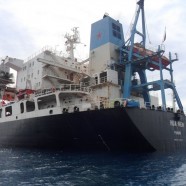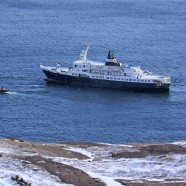Canada Vandalizes the Atlantic
Lyubov Orlova, Press release # 2
The decomissioned cruise ship Lyubov Orlova, now drifting in the Atlantic, is the responsibility of the Canadian authorities. Bearing the flag of the Cook Islands, the Lyubov Orlova was abandoned in the port of Saint John in Newfoundland in 2010, supposedly headed for demolition in the Dominican Republic after being sold by a Canadian broker to a Canadian resident of Iranian origins with interests in Saint-Domingue. Canada, the most recent country to harbour the cruise ship previously used for Arctic cruises, arranged for the Charlene Hunt, a tug boat constructed in 1962, to tow the ship on January 23. Shortly after the depart of the two ships, the tow cable broke, setting the Lyubov Orlova adrift. Due to security reasons, the Charlene Hunt was forced to return to the port of Saint-John. After the discovery of several deficiencies during the inspection of the vessel by the Canadian authorities, the Charlene Hunt must remain in port. Instead of inspecting the Charlene Hunt before its departure with the Lyubov Orlova in tow, as would have been in compliance with international maritime regulations, the Canadian authorities waited until after its return to port ; demonstrating a serious lack of foresight considering the requirements for a trans-oceanic towing.
The end of the Probo Koala
The Hua Wen, ex-Probo Koala is going to be demolished in the coming weeks in China. From August 2006 on, the scattering in Abidjan of desulphurization waste containing mercaptan and hydrogen sulphide has provoked a panic and the paralysis of Ivory Coast business capital. 16 fatalities were officially reported; the victims had been exposed to the toxic emanations. The toxic and stinky waste which had been unloaded from the Probo Koala slop tanks had illegally left Amsterdam and Tallinn, two North European ports (1).
The end of the Probo Koala
The Hua Wen, ex-Probo Koala is going to be demolished in the coming weeks in China. From August 2006 on, the scattering in Abidjan of desulphurization waste containing mercaptan and hydrogen sulphide has provoked a panic and the paralysis of Ivory Coast business capital. 16 fatalities were officially reported; the victims had been exposed to the toxic emanations. The toxic and stinky waste which had been unloaded from the Probo Koala slop tanks had illegally left Amsterdam and Tallinn, two North European ports (1).
The end of the Probo Koala
The Hua Wen, ex-Probo Koala is going to be demolished in the coming weeks in China. From August 2006 on, the scattering in Abidjan of desulphurization waste containing mercaptan and hydrogen sulphide has provoked a panic and the paralysis of Ivory Coast business capital. 16 fatalities were officially reported; the victims had been exposed to the toxic emanations. The toxic and stinky waste which had been unloaded from the Probo Koala slop tanks had illegally left Amsterdam and Tallinn, two North European ports (1).
Polar Bears: Left Out in the Cold
The polar bear (Ursus maritimus) is a marine mammal that lives off of the other marine mammals inhabiting the artic ice pack, and the surrounding ice flows and ocean. The polar bear is thus an excellent swimmer. The artic ice pack, home of the polar bear, is disappearing. The vulnerability and mortal risks faced by polar bears are increasing.
The polar bear, beloved by many, has become the martyr employed by governments and NGOs to symbolize the fight against global warming. It has become a fundraising symbol and a top-model.
Polar Bears: Left Out in the Cold
The polar bear (Ursus maritimus) is a marine mammal that lives off of the other marine mammals inhabiting the artic ice pack, and the surrounding ice flows and ocean. The polar bear is thus an excellent swimmer. The artic ice pack, home of the polar bear, is disappearing. The vulnerability and mortal risks faced by polar bears are increasing.
The polar bear, beloved by many, has become the martyr employed by governments and NGOs to symbolize the fight against global warming. It has become a fundraising symbol and a top-model.
For scrap and adrift, this is Canada’s motto
Lyubov Orlova, Press release # 1
Canada often sends its used commercial vessels to be broken up a long way away, in particular in Turkey.
In September 2011, the Canadian Miner, bound for Aliaga (Turkey) under tow, broke her towline, drifted and ran aground on Scatarie Island, in Nova Scotia. The cost of cutting and dismantling was evaluated at 24 million $. The wreck is dislocating and is a threat to the environment and the local fisheries. The Canadian Miner is still stranded on the island. The removal operations have been cancelled.
Lyubov Orlova, the ghost ship
Lyubov Orlova. IMO 7391434. Passenger ship. Length 100 m, 2,695 t. Cook Islands flag since 2009. Classification society Russian Maritime Register of Shipping. Built in 1976 in Kraljevica (Croatia) by Titovo. Detained in 2002 in Saint Petersburg (Russia). Former Soviet passenger ship owned by Far Eastern Shipping Company (Fesco) from Vladivostok ; acquired in 1986 by the Lubov Orlova Shipping Company, Malta based with Russian capital. This vessel with a capacity of 122 passengers was finally chartered by Cruise North Expeditions, an Inuit company which assigned her on their summer cruises in the Northern Canada. (Hudson and Baffin Bay …). As a result of salaries not paid to her 51 crew members and debts to her bunker suppliers she was seized on September 25th, 2010 in St John (Newfoundland, Canada). She was replaced by her sister-ship the Bahamian Clipper Adventurer (ex-Anna Tarasova) managed by International Shipping Partners, Miami. On August 27th, 2010, the Clipper Adventurer ran aground on a reef in the region of Nunavut, threatening the Canadian Arctic Ocean (Cf. “A new contaminated site in the Arctic”). The Lyubov Orlova was sold as is for an unknown destination of demolition. US $ 275 per ton.











